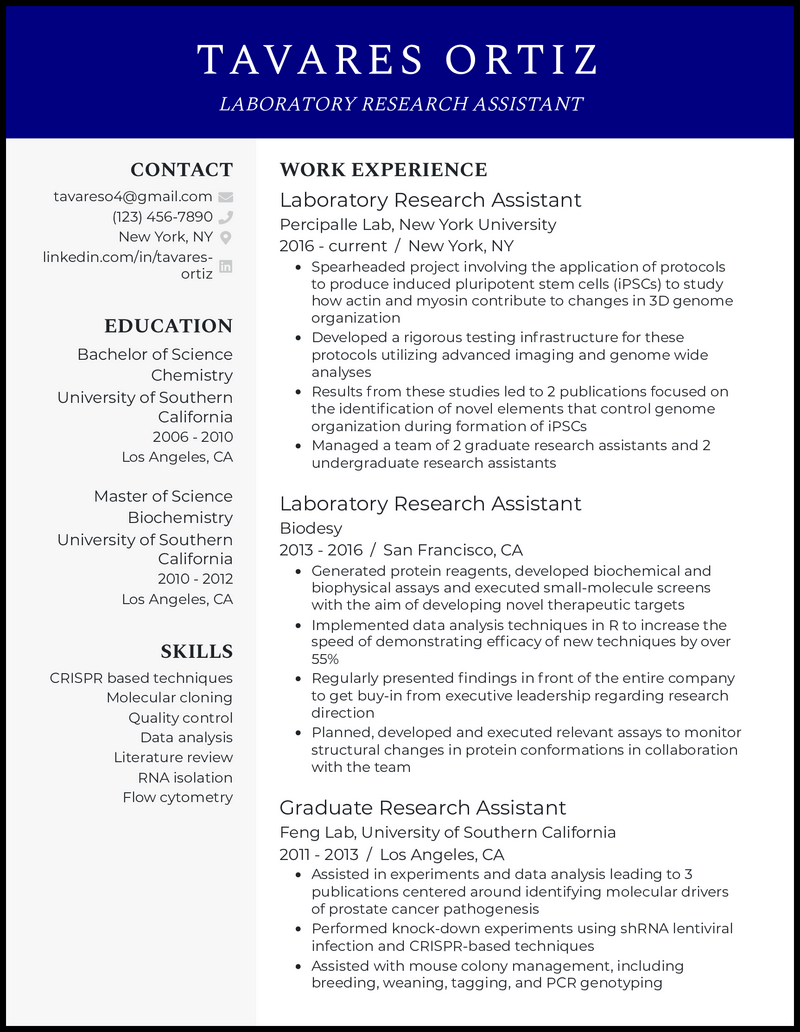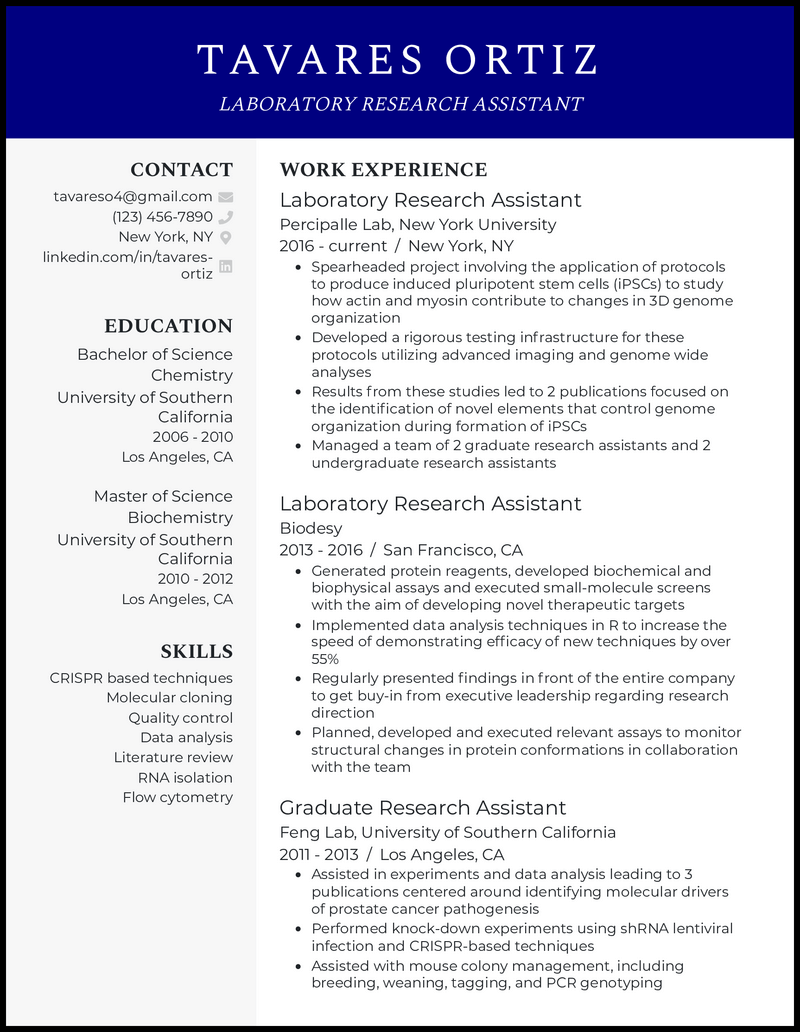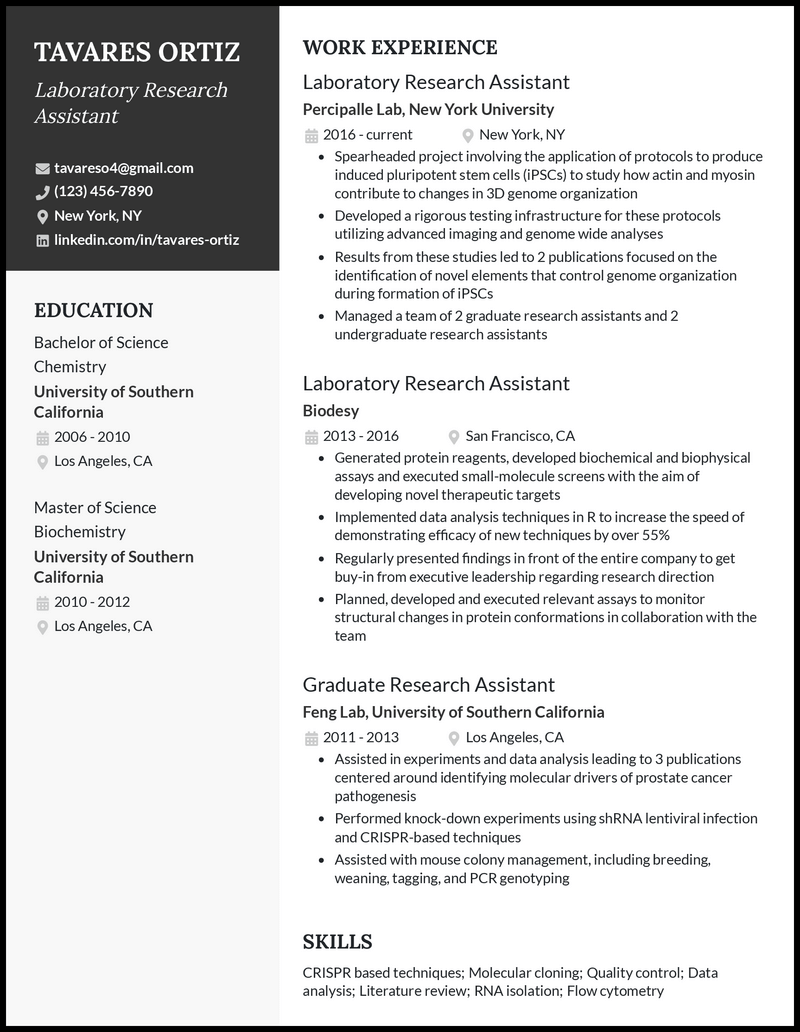
Laboratory Research Assistant



Best for candidates with 3+ years of experience
Resume Builder
Like this template? Customize this resume and make it your own with the help of our Al-powered suggestions, accent colors, and modern fonts.
You’re there at every turn to collect data and samples, logging and reporting them in spreadsheets and databases to ensure data integrity. You also might use statistical software applications, organize data, and help design new protocols.
But you might still have questions about how to organize your resume and write a cover letter to set off your ability to help test scientific processes and conduct experiments.
You’ll be all set with these three laboratory research assistant resume templates, which have already helped countless people in your field before!
What Matters Most: Your Skills & Job Experience

Considering the highly technical nature of any scientific field, you’ll want this section to feature primarily hard skills. Some soft skills and social abilities are important for collaboration in the lab, but recruiters are primarily interested in your technical skill set.
Avoid citing anything that could easily be applied to other jobs outside lab research assistance, like “research” or “communication.” Instead, re-frame your abilities to suit your role with things like “literature review” and “data presentation.”
Be specific, too: For example, branch off within skill sets like data management to present abilities like data analysis and quality control.
9 most popular laboratory research assistant skills
- CRISPR Techniques
- Molecular Cloning
- Quality Control
- Data Analysis
- Literature Review
- RNA Isolation
- Data Presentation
- Flow Cytometry
- MS Excel
Sample laboratory research assistant work experience bullet points
Your skills list is an excellent snapshot of what you can do, but your experience section shows how you’ve already done it. Recruiters sometimes even skip right to your job experience to learn about the time you used data analysis skills to optimize experimentation procedures.
Just make sure anything you list is relatable to your profession. And make sure you tailor your experiences to the individual job description: Don’t stress metrics about small-molecule screens if you’re applying to a company that’s all about team-based routing testing.
Highlight those metrics! If you have any sort of quantifiable data handy, like total savings pulled from your Excel sheet, include it.
Here’s what we mean:
- Implemented data analysis techniques in R to increase speed, demonstrating efficacy of new techniques by over 56%
- Regularly presented findings to entire company to get buy-in from executive leadership regarding research direction, improving laboratory efficiency by 9%
- Developed a rigorous testing infrastructure for private protocols using advanced imaging and genome-wide analysis, reducing reporting errors by 11%
- Planned, developed, and executed relevant assays to collaboratively monitor structural changes in protein conformations alongside team members, surpassing project expectations by 9 monthly hours on average
Top 5 Tips for Your Laboratory Research Assistant Resume
- Let your degrees glow
- If you have some impressive educational achievements under your belt, like a Bachelor’s in Chemistry, use strategic placement to ensure that your excellence is obvious within the layout of your resume!
- Speaking of layout . . .
- Pick a good template for your resume! Any of our templates will give you an excellent foundation to work with, but everyone’s qualifications are different. Pick whichever layout allows your molecular cloning abilities and scientific data analysis experiences to have their own pedestals.
- Show scientific understanding
- As a laboratory research assistant, you’ll need to be familiar with all stages of the scientific techniques employed at your workplace. Highlight this vital area of expertise by mentioning things like data analysis techniques, all the way to the final results presentations.
- Make readability top priority
- Fun colors and fonts can be fun, but that doesn’t mean they’re legible (or even good-looking!). Avoid using more than one or maybe two colors for headers or a key column section, and stick with clean, modern fonts.
- Don’t forget administrative stuff
- While you certainly spend plenty of time handling samples and experimentation procedures, you shouldn’t leave administrative experience like financial reporting and sample documentation out. Every phone call you take as a laboratory research assistant is important!
If you have professional references, definitely include them separately alongside your resume! Having others vouch for your agility and sample collection abilities in the laboratory will go a long way.
The best resumes are one page or less. Efficiency is key in your job role so that no time-sensitive experiments get mixed up and no reports are late, so show your ability to streamline complex information in your resume.
Not necessarily. If you’re switching careers or breaking into the working world, your resume might work best with a career objective. Just make sure you don’t repeat anything in your resume!











